Comprehensive Analysis of Organisational Behaviour at Hays Travel
VerifiedAdded on 2023/01/09
|19
|4652
|39
Report
AI Summary
This report delves into the organisational behaviour of Hays Travel, examining the interplay of power, culture, and politics and their impact on individual and team performance. It explores various types of power, including coercive, reward, expert, referent, information, and legitimate power, and analyzes the influence of organisational politics on employee attitudes and the work environment. The report also discusses Handy's cultural theory, categorizing organisational culture into power, role, person, and task cultures. Furthermore, it evaluates content and process theories of motivation, such as Maslow's hierarchy of needs and Vroom's expectancy theory, and their application in achieving organisational goals. The report also examines the effectiveness of different types of teams and the application of organisational behaviour philosophies in a business context.
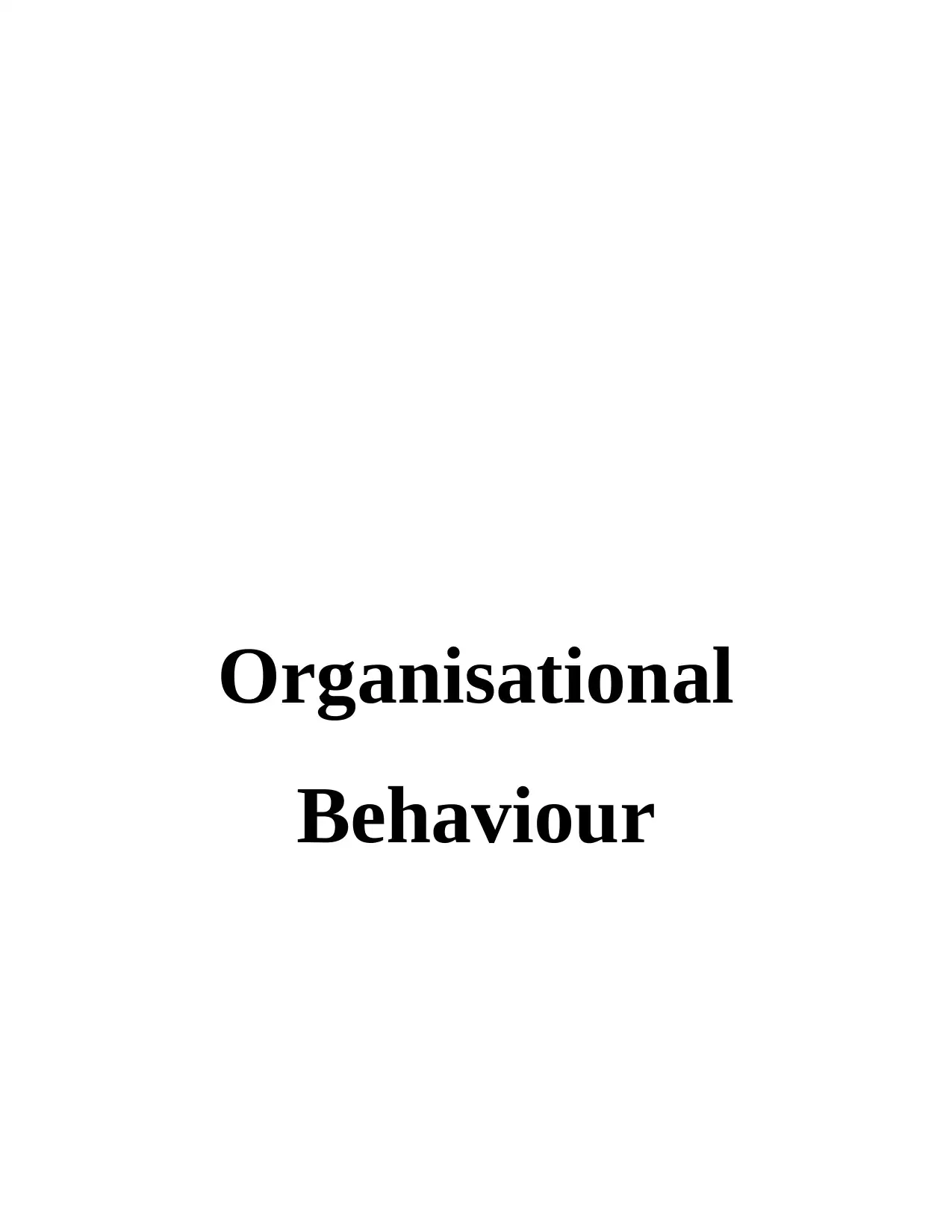
Organisational
Behaviour
Behaviour
Paraphrase This Document
Need a fresh take? Get an instant paraphrase of this document with our AI Paraphraser
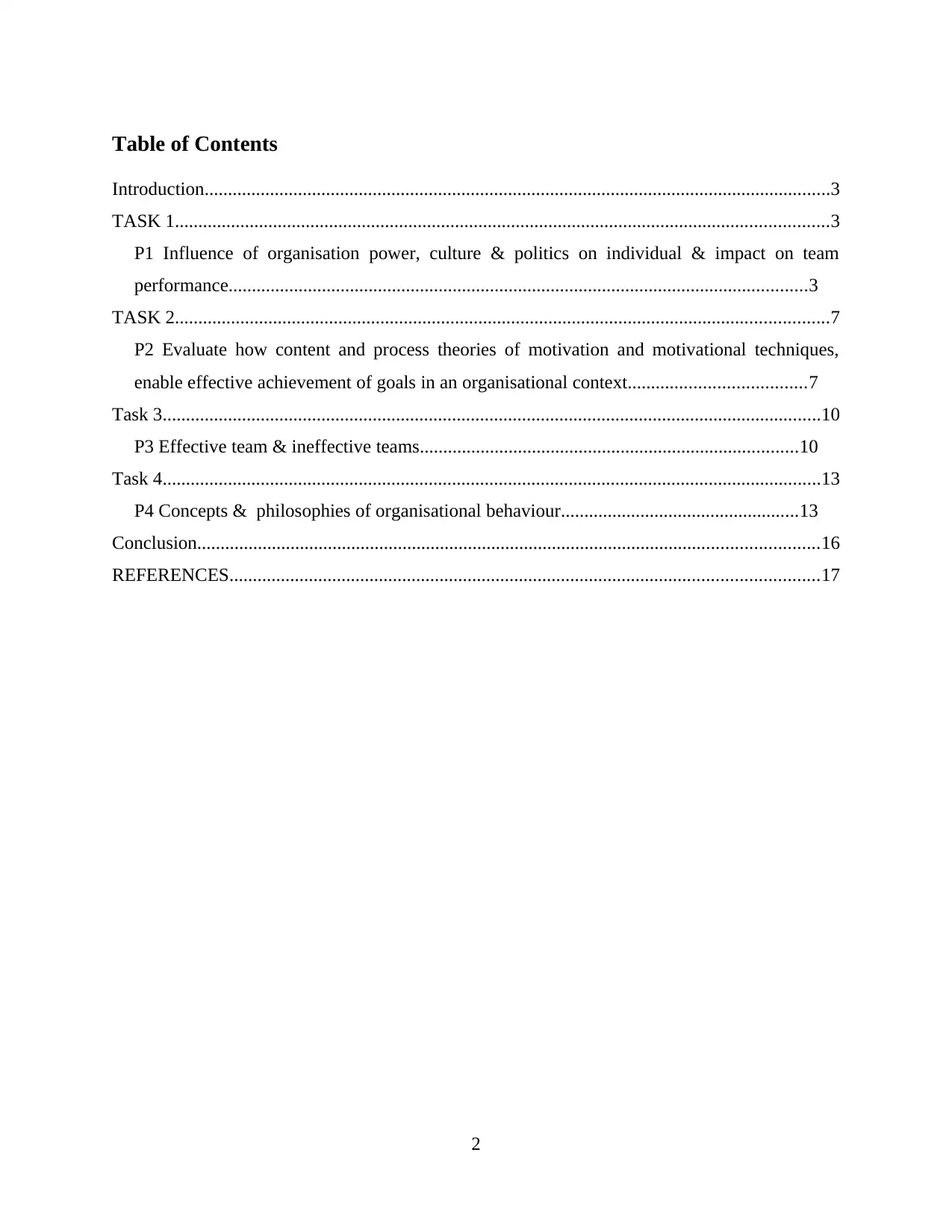
Table of Contents
Introduction......................................................................................................................................3
TASK 1............................................................................................................................................3
P1 Influence of organisation power, culture & politics on individual & impact on team
performance............................................................................................................................3
TASK 2............................................................................................................................................7
P2 Evaluate how content and process theories of motivation and motivational techniques,
enable effective achievement of goals in an organisational context......................................7
Task 3.............................................................................................................................................10
P3 Effective team & ineffective teams.................................................................................10
Task 4.............................................................................................................................................13
P4 Concepts & philosophies of organisational behaviour...................................................13
Conclusion.....................................................................................................................................16
REFERENCES..............................................................................................................................17
2
Introduction......................................................................................................................................3
TASK 1............................................................................................................................................3
P1 Influence of organisation power, culture & politics on individual & impact on team
performance............................................................................................................................3
TASK 2............................................................................................................................................7
P2 Evaluate how content and process theories of motivation and motivational techniques,
enable effective achievement of goals in an organisational context......................................7
Task 3.............................................................................................................................................10
P3 Effective team & ineffective teams.................................................................................10
Task 4.............................................................................................................................................13
P4 Concepts & philosophies of organisational behaviour...................................................13
Conclusion.....................................................................................................................................16
REFERENCES..............................................................................................................................17
2
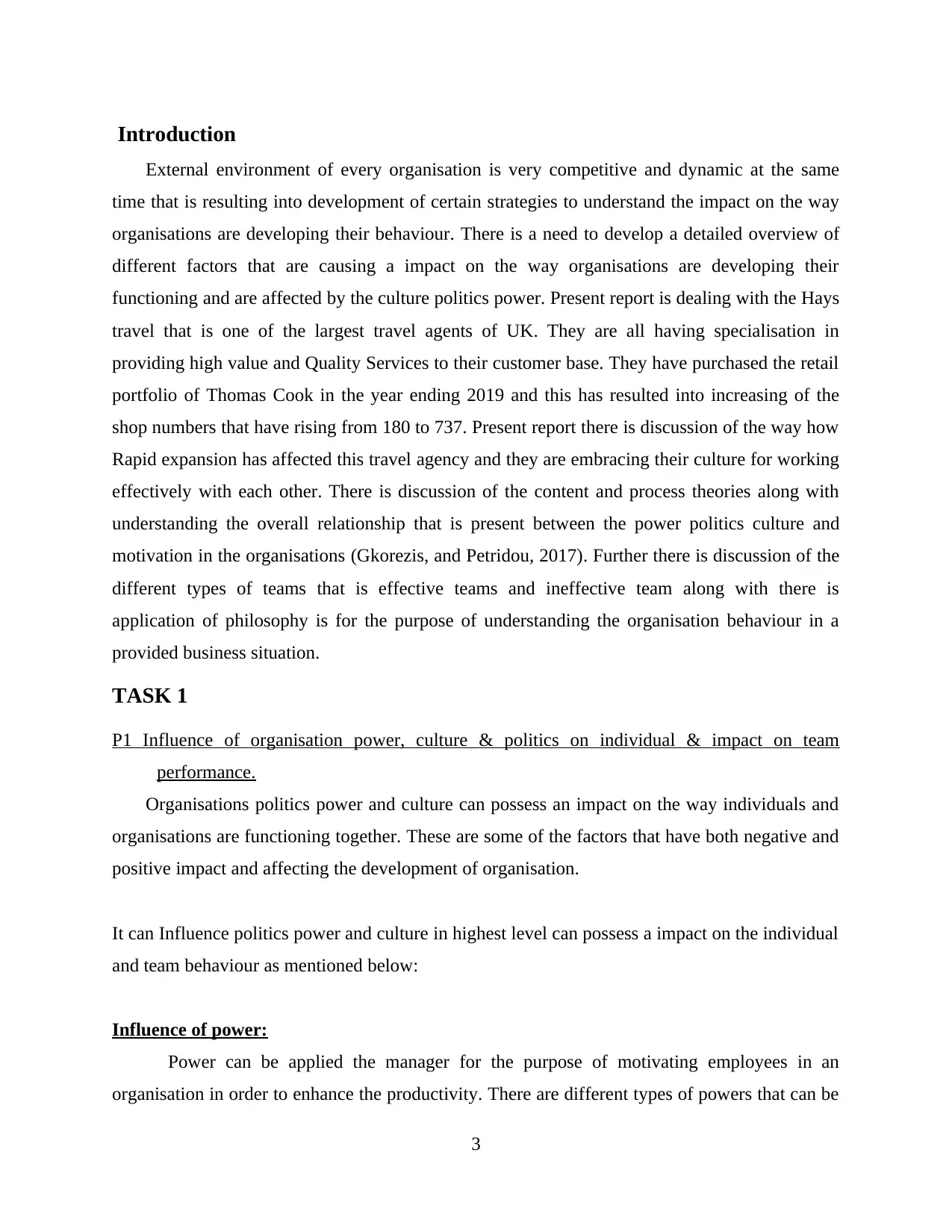
Introduction
External environment of every organisation is very competitive and dynamic at the same
time that is resulting into development of certain strategies to understand the impact on the way
organisations are developing their behaviour. There is a need to develop a detailed overview of
different factors that are causing a impact on the way organisations are developing their
functioning and are affected by the culture politics power. Present report is dealing with the Hays
travel that is one of the largest travel agents of UK. They are all having specialisation in
providing high value and Quality Services to their customer base. They have purchased the retail
portfolio of Thomas Cook in the year ending 2019 and this has resulted into increasing of the
shop numbers that have rising from 180 to 737. Present report there is discussion of the way how
Rapid expansion has affected this travel agency and they are embracing their culture for working
effectively with each other. There is discussion of the content and process theories along with
understanding the overall relationship that is present between the power politics culture and
motivation in the organisations (Gkorezis, and Petridou, 2017). Further there is discussion of the
different types of teams that is effective teams and ineffective team along with there is
application of philosophy is for the purpose of understanding the organisation behaviour in a
provided business situation.
TASK 1
P1 Influence of organisation power, culture & politics on individual & impact on team
performance.
Organisations politics power and culture can possess an impact on the way individuals and
organisations are functioning together. These are some of the factors that have both negative and
positive impact and affecting the development of organisation.
It can Influence politics power and culture in highest level can possess a impact on the individual
and team behaviour as mentioned below:
Influence of power:
Power can be applied the manager for the purpose of motivating employees in an
organisation in order to enhance the productivity. There are different types of powers that can be
3
External environment of every organisation is very competitive and dynamic at the same
time that is resulting into development of certain strategies to understand the impact on the way
organisations are developing their behaviour. There is a need to develop a detailed overview of
different factors that are causing a impact on the way organisations are developing their
functioning and are affected by the culture politics power. Present report is dealing with the Hays
travel that is one of the largest travel agents of UK. They are all having specialisation in
providing high value and Quality Services to their customer base. They have purchased the retail
portfolio of Thomas Cook in the year ending 2019 and this has resulted into increasing of the
shop numbers that have rising from 180 to 737. Present report there is discussion of the way how
Rapid expansion has affected this travel agency and they are embracing their culture for working
effectively with each other. There is discussion of the content and process theories along with
understanding the overall relationship that is present between the power politics culture and
motivation in the organisations (Gkorezis, and Petridou, 2017). Further there is discussion of the
different types of teams that is effective teams and ineffective team along with there is
application of philosophy is for the purpose of understanding the organisation behaviour in a
provided business situation.
TASK 1
P1 Influence of organisation power, culture & politics on individual & impact on team
performance.
Organisations politics power and culture can possess an impact on the way individuals and
organisations are functioning together. These are some of the factors that have both negative and
positive impact and affecting the development of organisation.
It can Influence politics power and culture in highest level can possess a impact on the individual
and team behaviour as mentioned below:
Influence of power:
Power can be applied the manager for the purpose of motivating employees in an
organisation in order to enhance the productivity. There are different types of powers that can be
3
⊘ This is a preview!⊘
Do you want full access?
Subscribe today to unlock all pages.

Trusted by 1+ million students worldwide
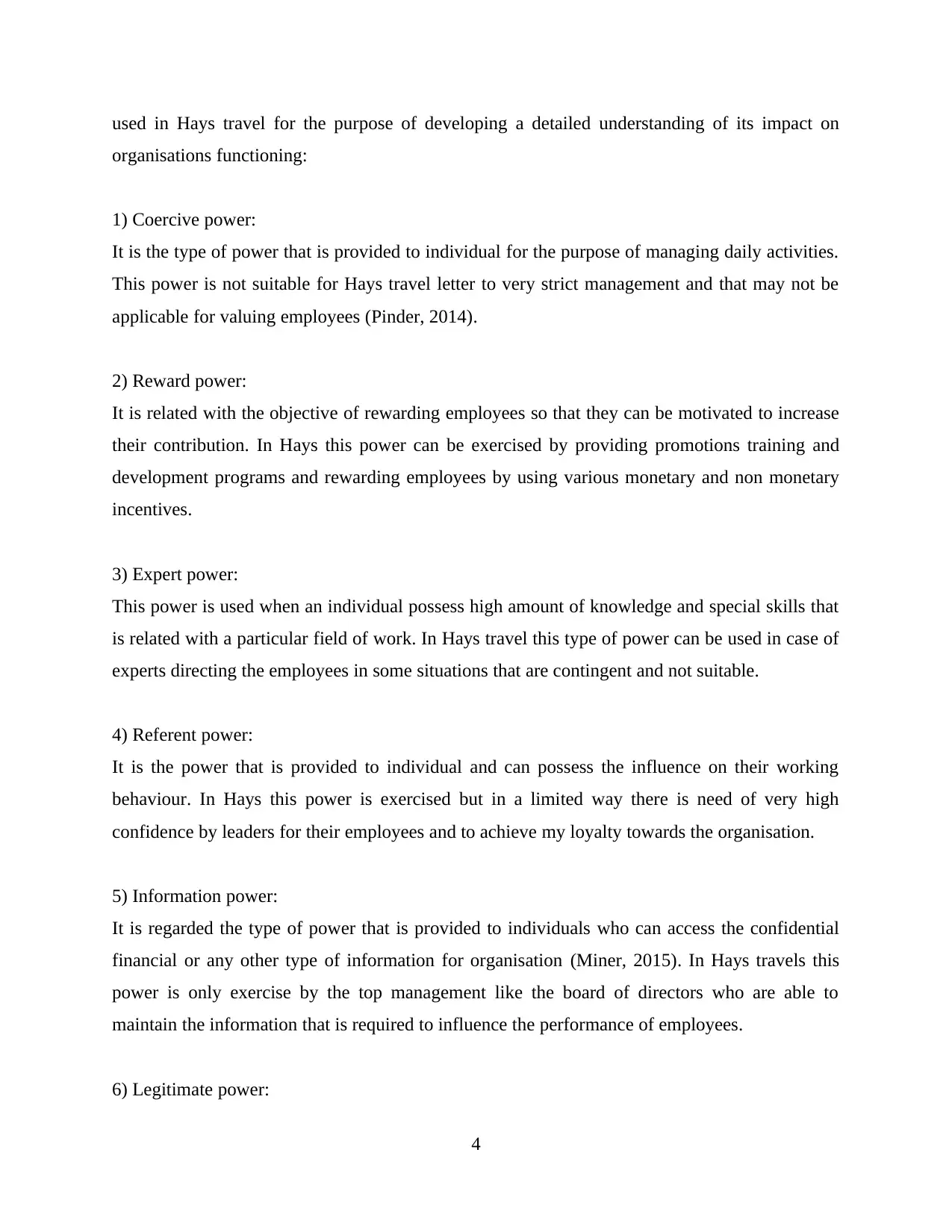
used in Hays travel for the purpose of developing a detailed understanding of its impact on
organisations functioning:
1) Coercive power:
It is the type of power that is provided to individual for the purpose of managing daily activities.
This power is not suitable for Hays travel letter to very strict management and that may not be
applicable for valuing employees (Pinder, 2014).
2) Reward power:
It is related with the objective of rewarding employees so that they can be motivated to increase
their contribution. In Hays this power can be exercised by providing promotions training and
development programs and rewarding employees by using various monetary and non monetary
incentives.
3) Expert power:
This power is used when an individual possess high amount of knowledge and special skills that
is related with a particular field of work. In Hays travel this type of power can be used in case of
experts directing the employees in some situations that are contingent and not suitable.
4) Referent power:
It is the power that is provided to individual and can possess the influence on their working
behaviour. In Hays this power is exercised but in a limited way there is need of very high
confidence by leaders for their employees and to achieve my loyalty towards the organisation.
5) Information power:
It is regarded the type of power that is provided to individuals who can access the confidential
financial or any other type of information for organisation (Miner, 2015). In Hays travels this
power is only exercise by the top management like the board of directors who are able to
maintain the information that is required to influence the performance of employees.
6) Legitimate power:
4
organisations functioning:
1) Coercive power:
It is the type of power that is provided to individual for the purpose of managing daily activities.
This power is not suitable for Hays travel letter to very strict management and that may not be
applicable for valuing employees (Pinder, 2014).
2) Reward power:
It is related with the objective of rewarding employees so that they can be motivated to increase
their contribution. In Hays this power can be exercised by providing promotions training and
development programs and rewarding employees by using various monetary and non monetary
incentives.
3) Expert power:
This power is used when an individual possess high amount of knowledge and special skills that
is related with a particular field of work. In Hays travel this type of power can be used in case of
experts directing the employees in some situations that are contingent and not suitable.
4) Referent power:
It is the power that is provided to individual and can possess the influence on their working
behaviour. In Hays this power is exercised but in a limited way there is need of very high
confidence by leaders for their employees and to achieve my loyalty towards the organisation.
5) Information power:
It is regarded the type of power that is provided to individuals who can access the confidential
financial or any other type of information for organisation (Miner, 2015). In Hays travels this
power is only exercise by the top management like the board of directors who are able to
maintain the information that is required to influence the performance of employees.
6) Legitimate power:
4
Paraphrase This Document
Need a fresh take? Get an instant paraphrase of this document with our AI Paraphraser
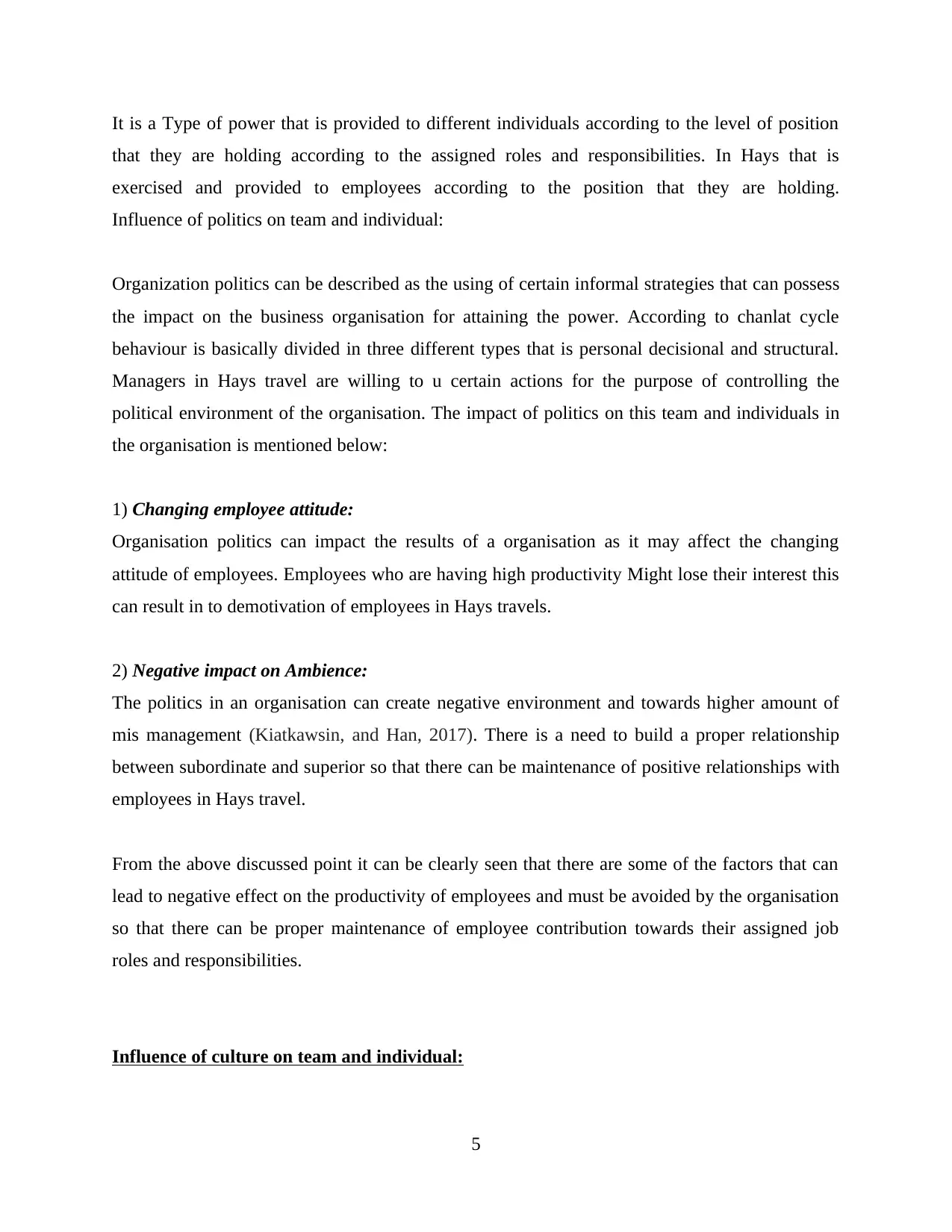
It is a Type of power that is provided to different individuals according to the level of position
that they are holding according to the assigned roles and responsibilities. In Hays that is
exercised and provided to employees according to the position that they are holding.
Influence of politics on team and individual:
Organization politics can be described as the using of certain informal strategies that can possess
the impact on the business organisation for attaining the power. According to chanlat cycle
behaviour is basically divided in three different types that is personal decisional and structural.
Managers in Hays travel are willing to u certain actions for the purpose of controlling the
political environment of the organisation. The impact of politics on this team and individuals in
the organisation is mentioned below:
1) Changing employee attitude:
Organisation politics can impact the results of a organisation as it may affect the changing
attitude of employees. Employees who are having high productivity Might lose their interest this
can result in to demotivation of employees in Hays travels.
2) Negative impact on Ambience:
The politics in an organisation can create negative environment and towards higher amount of
mis management (Kiatkawsin, and Han, 2017). There is a need to build a proper relationship
between subordinate and superior so that there can be maintenance of positive relationships with
employees in Hays travel.
From the above discussed point it can be clearly seen that there are some of the factors that can
lead to negative effect on the productivity of employees and must be avoided by the organisation
so that there can be proper maintenance of employee contribution towards their assigned job
roles and responsibilities.
Influence of culture on team and individual:
5
that they are holding according to the assigned roles and responsibilities. In Hays that is
exercised and provided to employees according to the position that they are holding.
Influence of politics on team and individual:
Organization politics can be described as the using of certain informal strategies that can possess
the impact on the business organisation for attaining the power. According to chanlat cycle
behaviour is basically divided in three different types that is personal decisional and structural.
Managers in Hays travel are willing to u certain actions for the purpose of controlling the
political environment of the organisation. The impact of politics on this team and individuals in
the organisation is mentioned below:
1) Changing employee attitude:
Organisation politics can impact the results of a organisation as it may affect the changing
attitude of employees. Employees who are having high productivity Might lose their interest this
can result in to demotivation of employees in Hays travels.
2) Negative impact on Ambience:
The politics in an organisation can create negative environment and towards higher amount of
mis management (Kiatkawsin, and Han, 2017). There is a need to build a proper relationship
between subordinate and superior so that there can be maintenance of positive relationships with
employees in Hays travel.
From the above discussed point it can be clearly seen that there are some of the factors that can
lead to negative effect on the productivity of employees and must be avoided by the organisation
so that there can be proper maintenance of employee contribution towards their assigned job
roles and responsibilities.
Influence of culture on team and individual:
5
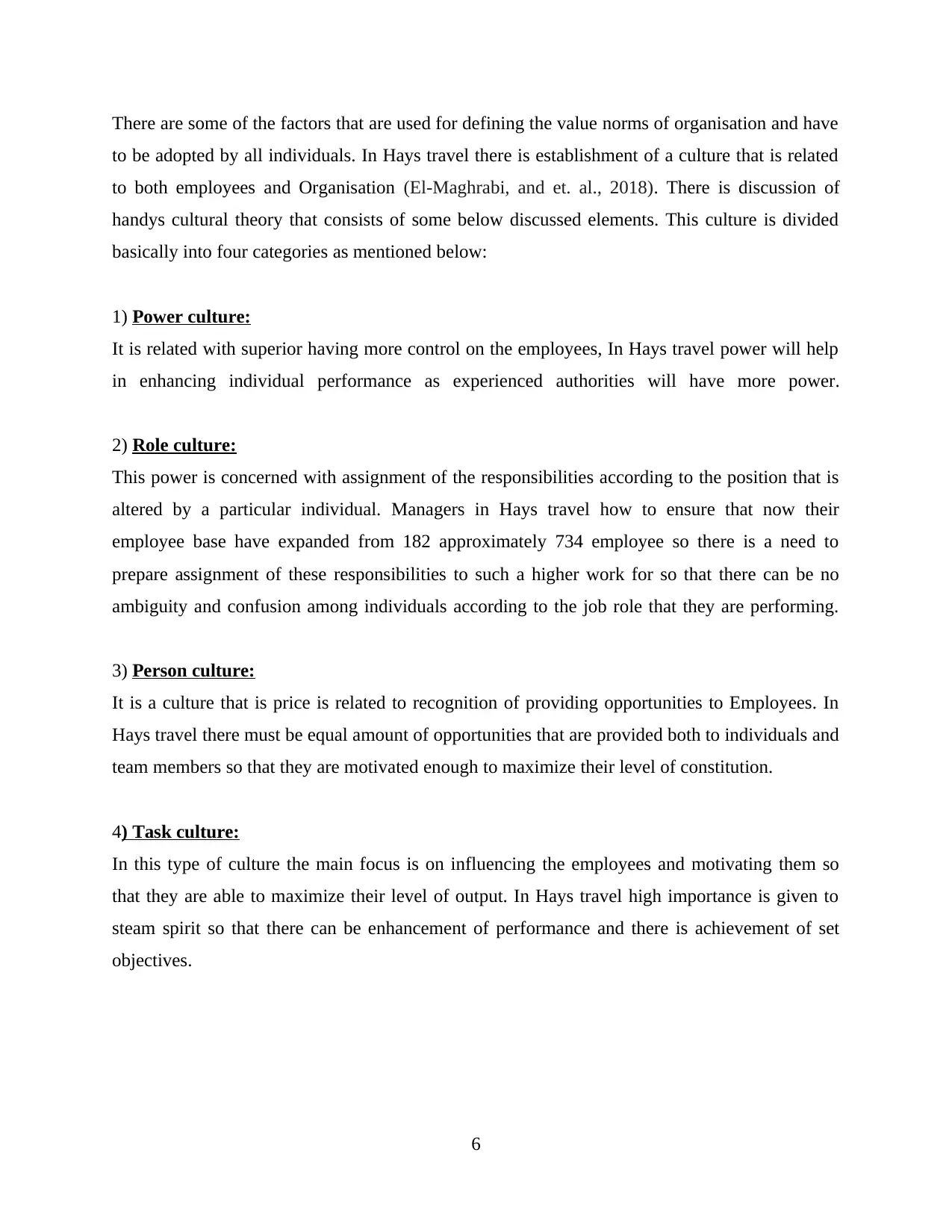
There are some of the factors that are used for defining the value norms of organisation and have
to be adopted by all individuals. In Hays travel there is establishment of a culture that is related
to both employees and Organisation (El-Maghrabi, and et. al., 2018). There is discussion of
handys cultural theory that consists of some below discussed elements. This culture is divided
basically into four categories as mentioned below:
1) Power culture:
It is related with superior having more control on the employees, In Hays travel power will help
in enhancing individual performance as experienced authorities will have more power.
2) Role culture:
This power is concerned with assignment of the responsibilities according to the position that is
altered by a particular individual. Managers in Hays travel how to ensure that now their
employee base have expanded from 182 approximately 734 employee so there is a need to
prepare assignment of these responsibilities to such a higher work for so that there can be no
ambiguity and confusion among individuals according to the job role that they are performing.
3) Person culture:
It is a culture that is price is related to recognition of providing opportunities to Employees. In
Hays travel there must be equal amount of opportunities that are provided both to individuals and
team members so that they are motivated enough to maximize their level of constitution.
4) Task culture:
In this type of culture the main focus is on influencing the employees and motivating them so
that they are able to maximize their level of output. In Hays travel high importance is given to
steam spirit so that there can be enhancement of performance and there is achievement of set
objectives.
6
to be adopted by all individuals. In Hays travel there is establishment of a culture that is related
to both employees and Organisation (El-Maghrabi, and et. al., 2018). There is discussion of
handys cultural theory that consists of some below discussed elements. This culture is divided
basically into four categories as mentioned below:
1) Power culture:
It is related with superior having more control on the employees, In Hays travel power will help
in enhancing individual performance as experienced authorities will have more power.
2) Role culture:
This power is concerned with assignment of the responsibilities according to the position that is
altered by a particular individual. Managers in Hays travel how to ensure that now their
employee base have expanded from 182 approximately 734 employee so there is a need to
prepare assignment of these responsibilities to such a higher work for so that there can be no
ambiguity and confusion among individuals according to the job role that they are performing.
3) Person culture:
It is a culture that is price is related to recognition of providing opportunities to Employees. In
Hays travel there must be equal amount of opportunities that are provided both to individuals and
team members so that they are motivated enough to maximize their level of constitution.
4) Task culture:
In this type of culture the main focus is on influencing the employees and motivating them so
that they are able to maximize their level of output. In Hays travel high importance is given to
steam spirit so that there can be enhancement of performance and there is achievement of set
objectives.
6
⊘ This is a preview!⊘
Do you want full access?
Subscribe today to unlock all pages.

Trusted by 1+ million students worldwide
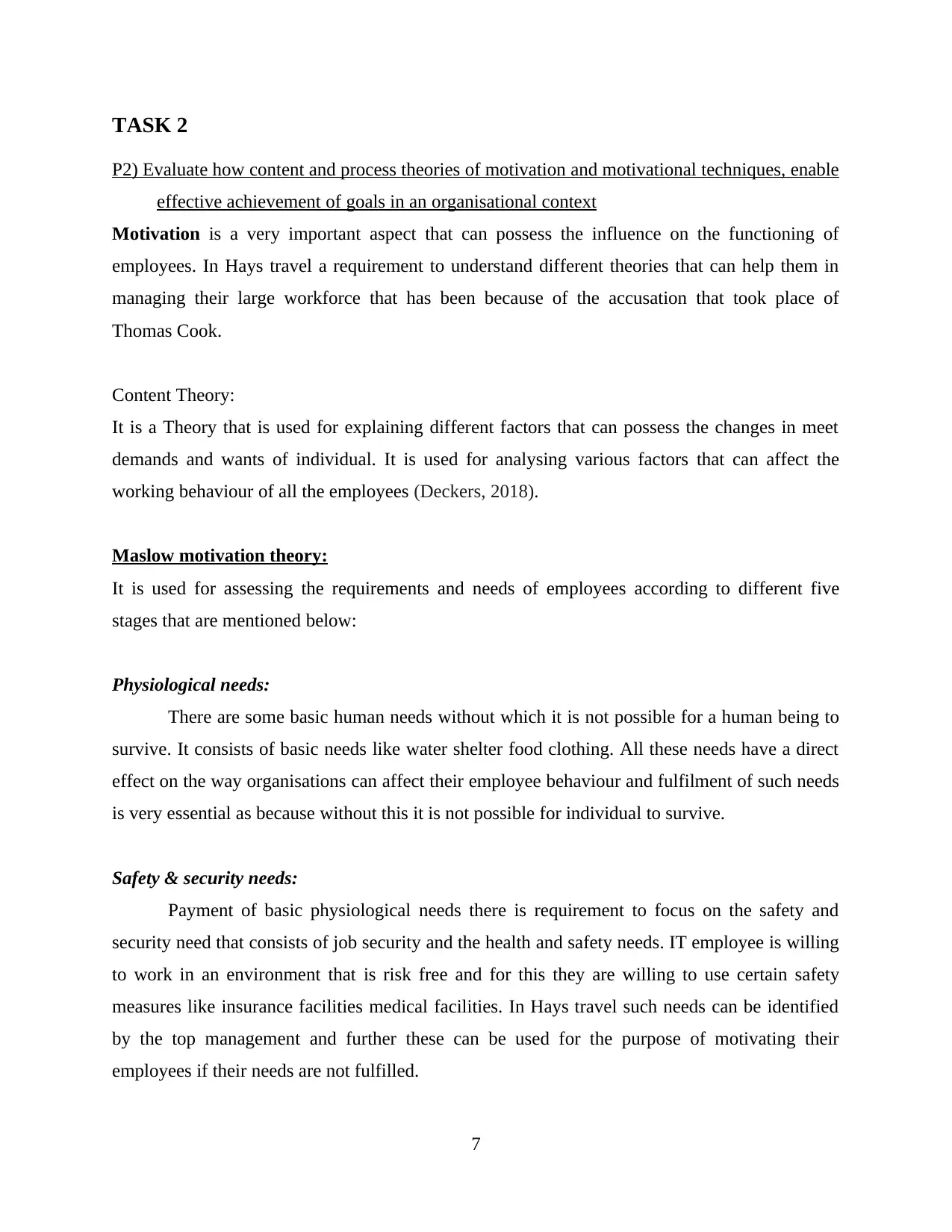
TASK 2
P2) Evaluate how content and process theories of motivation and motivational techniques, enable
effective achievement of goals in an organisational context
Motivation is a very important aspect that can possess the influence on the functioning of
employees. In Hays travel a requirement to understand different theories that can help them in
managing their large workforce that has been because of the accusation that took place of
Thomas Cook.
Content Theory:
It is a Theory that is used for explaining different factors that can possess the changes in meet
demands and wants of individual. It is used for analysing various factors that can affect the
working behaviour of all the employees (Deckers, 2018).
Maslow motivation theory:
It is used for assessing the requirements and needs of employees according to different five
stages that are mentioned below:
Physiological needs:
There are some basic human needs without which it is not possible for a human being to
survive. It consists of basic needs like water shelter food clothing. All these needs have a direct
effect on the way organisations can affect their employee behaviour and fulfilment of such needs
is very essential as because without this it is not possible for individual to survive.
Safety & security needs:
Payment of basic physiological needs there is requirement to focus on the safety and
security need that consists of job security and the health and safety needs. IT employee is willing
to work in an environment that is risk free and for this they are willing to use certain safety
measures like insurance facilities medical facilities. In Hays travel such needs can be identified
by the top management and further these can be used for the purpose of motivating their
employees if their needs are not fulfilled.
7
P2) Evaluate how content and process theories of motivation and motivational techniques, enable
effective achievement of goals in an organisational context
Motivation is a very important aspect that can possess the influence on the functioning of
employees. In Hays travel a requirement to understand different theories that can help them in
managing their large workforce that has been because of the accusation that took place of
Thomas Cook.
Content Theory:
It is a Theory that is used for explaining different factors that can possess the changes in meet
demands and wants of individual. It is used for analysing various factors that can affect the
working behaviour of all the employees (Deckers, 2018).
Maslow motivation theory:
It is used for assessing the requirements and needs of employees according to different five
stages that are mentioned below:
Physiological needs:
There are some basic human needs without which it is not possible for a human being to
survive. It consists of basic needs like water shelter food clothing. All these needs have a direct
effect on the way organisations can affect their employee behaviour and fulfilment of such needs
is very essential as because without this it is not possible for individual to survive.
Safety & security needs:
Payment of basic physiological needs there is requirement to focus on the safety and
security need that consists of job security and the health and safety needs. IT employee is willing
to work in an environment that is risk free and for this they are willing to use certain safety
measures like insurance facilities medical facilities. In Hays travel such needs can be identified
by the top management and further these can be used for the purpose of motivating their
employees if their needs are not fulfilled.
7
Paraphrase This Document
Need a fresh take? Get an instant paraphrase of this document with our AI Paraphraser
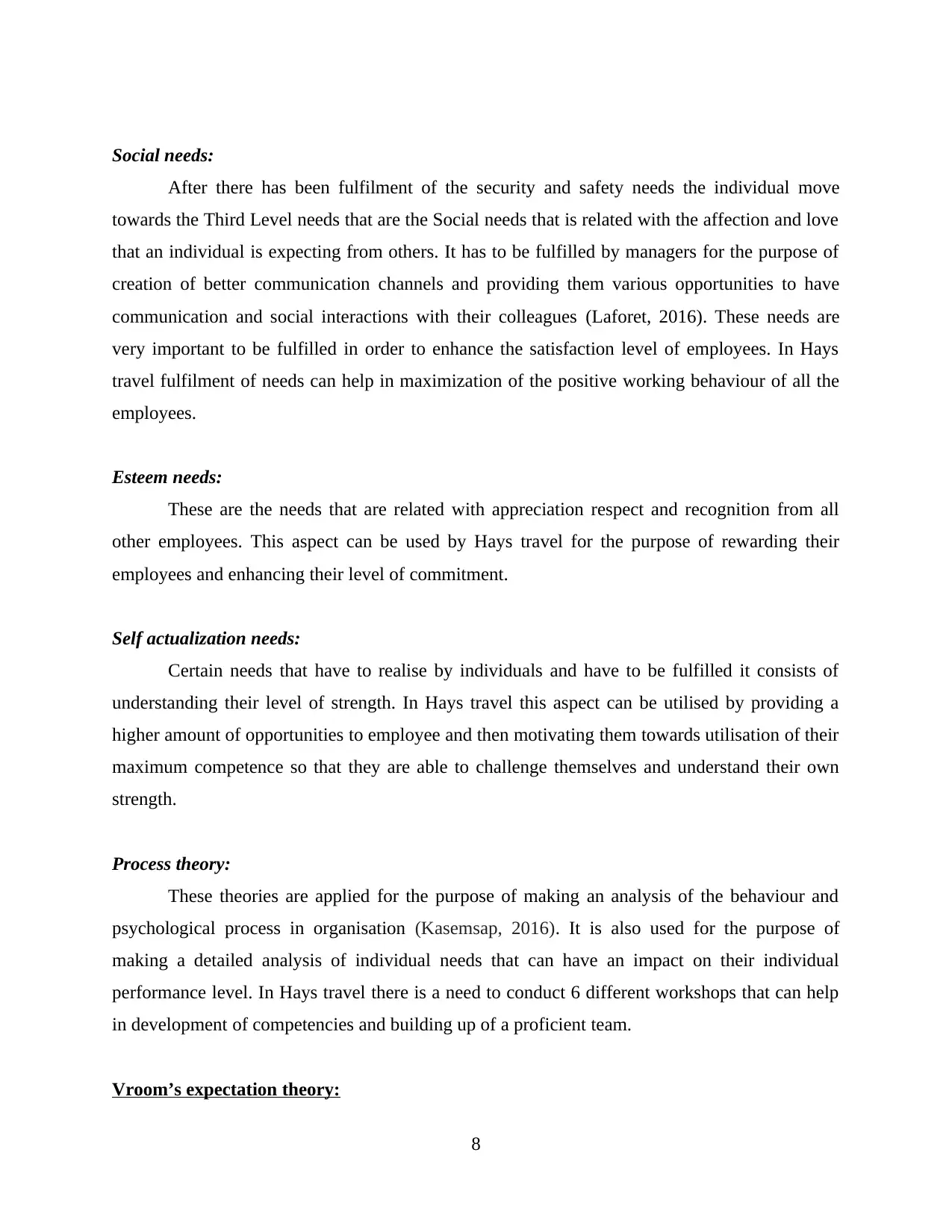
Social needs:
After there has been fulfilment of the security and safety needs the individual move
towards the Third Level needs that are the Social needs that is related with the affection and love
that an individual is expecting from others. It has to be fulfilled by managers for the purpose of
creation of better communication channels and providing them various opportunities to have
communication and social interactions with their colleagues (Laforet, 2016). These needs are
very important to be fulfilled in order to enhance the satisfaction level of employees. In Hays
travel fulfilment of needs can help in maximization of the positive working behaviour of all the
employees.
Esteem needs:
These are the needs that are related with appreciation respect and recognition from all
other employees. This aspect can be used by Hays travel for the purpose of rewarding their
employees and enhancing their level of commitment.
Self actualization needs:
Certain needs that have to realise by individuals and have to be fulfilled it consists of
understanding their level of strength. In Hays travel this aspect can be utilised by providing a
higher amount of opportunities to employee and then motivating them towards utilisation of their
maximum competence so that they are able to challenge themselves and understand their own
strength.
Process theory:
These theories are applied for the purpose of making an analysis of the behaviour and
psychological process in organisation (Kasemsap, 2016). It is also used for the purpose of
making a detailed analysis of individual needs that can have an impact on their individual
performance level. In Hays travel there is a need to conduct 6 different workshops that can help
in development of competencies and building up of a proficient team.
Vroom’s expectation theory:
8
After there has been fulfilment of the security and safety needs the individual move
towards the Third Level needs that are the Social needs that is related with the affection and love
that an individual is expecting from others. It has to be fulfilled by managers for the purpose of
creation of better communication channels and providing them various opportunities to have
communication and social interactions with their colleagues (Laforet, 2016). These needs are
very important to be fulfilled in order to enhance the satisfaction level of employees. In Hays
travel fulfilment of needs can help in maximization of the positive working behaviour of all the
employees.
Esteem needs:
These are the needs that are related with appreciation respect and recognition from all
other employees. This aspect can be used by Hays travel for the purpose of rewarding their
employees and enhancing their level of commitment.
Self actualization needs:
Certain needs that have to realise by individuals and have to be fulfilled it consists of
understanding their level of strength. In Hays travel this aspect can be utilised by providing a
higher amount of opportunities to employee and then motivating them towards utilisation of their
maximum competence so that they are able to challenge themselves and understand their own
strength.
Process theory:
These theories are applied for the purpose of making an analysis of the behaviour and
psychological process in organisation (Kasemsap, 2016). It is also used for the purpose of
making a detailed analysis of individual needs that can have an impact on their individual
performance level. In Hays travel there is a need to conduct 6 different workshops that can help
in development of competencies and building up of a proficient team.
Vroom’s expectation theory:
8
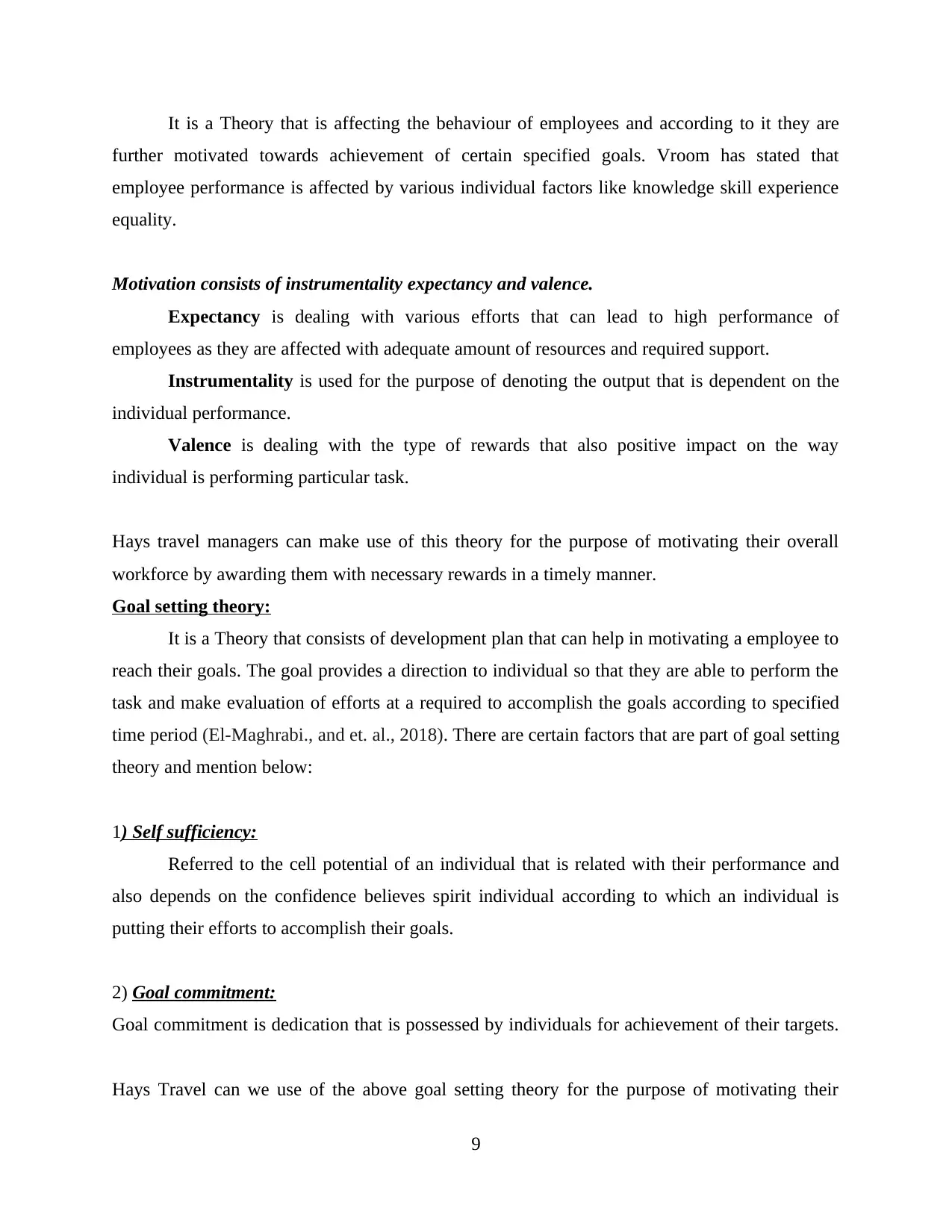
It is a Theory that is affecting the behaviour of employees and according to it they are
further motivated towards achievement of certain specified goals. Vroom has stated that
employee performance is affected by various individual factors like knowledge skill experience
equality.
Motivation consists of instrumentality expectancy and valence.
Expectancy is dealing with various efforts that can lead to high performance of
employees as they are affected with adequate amount of resources and required support.
Instrumentality is used for the purpose of denoting the output that is dependent on the
individual performance.
Valence is dealing with the type of rewards that also positive impact on the way
individual is performing particular task.
Hays travel managers can make use of this theory for the purpose of motivating their overall
workforce by awarding them with necessary rewards in a timely manner.
Goal setting theory:
It is a Theory that consists of development plan that can help in motivating a employee to
reach their goals. The goal provides a direction to individual so that they are able to perform the
task and make evaluation of efforts at a required to accomplish the goals according to specified
time period (El-Maghrabi., and et. al., 2018). There are certain factors that are part of goal setting
theory and mention below:
1) Self sufficiency:
Referred to the cell potential of an individual that is related with their performance and
also depends on the confidence believes spirit individual according to which an individual is
putting their efforts to accomplish their goals.
2) Goal commitment:
Goal commitment is dedication that is possessed by individuals for achievement of their targets.
Hays Travel can we use of the above goal setting theory for the purpose of motivating their
9
further motivated towards achievement of certain specified goals. Vroom has stated that
employee performance is affected by various individual factors like knowledge skill experience
equality.
Motivation consists of instrumentality expectancy and valence.
Expectancy is dealing with various efforts that can lead to high performance of
employees as they are affected with adequate amount of resources and required support.
Instrumentality is used for the purpose of denoting the output that is dependent on the
individual performance.
Valence is dealing with the type of rewards that also positive impact on the way
individual is performing particular task.
Hays travel managers can make use of this theory for the purpose of motivating their overall
workforce by awarding them with necessary rewards in a timely manner.
Goal setting theory:
It is a Theory that consists of development plan that can help in motivating a employee to
reach their goals. The goal provides a direction to individual so that they are able to perform the
task and make evaluation of efforts at a required to accomplish the goals according to specified
time period (El-Maghrabi., and et. al., 2018). There are certain factors that are part of goal setting
theory and mention below:
1) Self sufficiency:
Referred to the cell potential of an individual that is related with their performance and
also depends on the confidence believes spirit individual according to which an individual is
putting their efforts to accomplish their goals.
2) Goal commitment:
Goal commitment is dedication that is possessed by individuals for achievement of their targets.
Hays Travel can we use of the above goal setting theory for the purpose of motivating their
9
⊘ This is a preview!⊘
Do you want full access?
Subscribe today to unlock all pages.

Trusted by 1+ million students worldwide
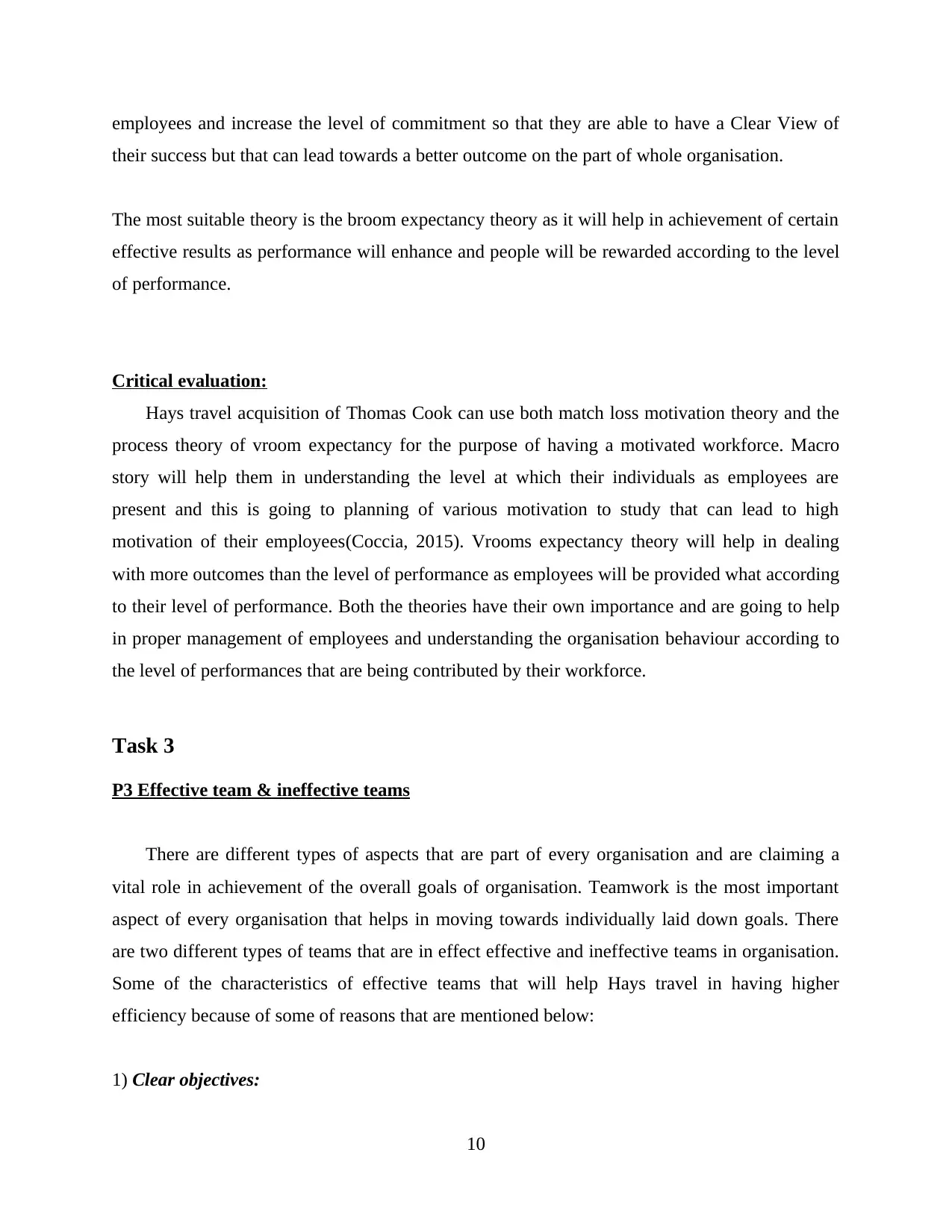
employees and increase the level of commitment so that they are able to have a Clear View of
their success but that can lead towards a better outcome on the part of whole organisation.
The most suitable theory is the broom expectancy theory as it will help in achievement of certain
effective results as performance will enhance and people will be rewarded according to the level
of performance.
Critical evaluation:
Hays travel acquisition of Thomas Cook can use both match loss motivation theory and the
process theory of vroom expectancy for the purpose of having a motivated workforce. Macro
story will help them in understanding the level at which their individuals as employees are
present and this is going to planning of various motivation to study that can lead to high
motivation of their employees(Coccia, 2015). Vrooms expectancy theory will help in dealing
with more outcomes than the level of performance as employees will be provided what according
to their level of performance. Both the theories have their own importance and are going to help
in proper management of employees and understanding the organisation behaviour according to
the level of performances that are being contributed by their workforce.
Task 3
P3 Effective team & ineffective teams
There are different types of aspects that are part of every organisation and are claiming a
vital role in achievement of the overall goals of organisation. Teamwork is the most important
aspect of every organisation that helps in moving towards individually laid down goals. There
are two different types of teams that are in effect effective and ineffective teams in organisation.
Some of the characteristics of effective teams that will help Hays travel in having higher
efficiency because of some of reasons that are mentioned below:
1) Clear objectives:
10
their success but that can lead towards a better outcome on the part of whole organisation.
The most suitable theory is the broom expectancy theory as it will help in achievement of certain
effective results as performance will enhance and people will be rewarded according to the level
of performance.
Critical evaluation:
Hays travel acquisition of Thomas Cook can use both match loss motivation theory and the
process theory of vroom expectancy for the purpose of having a motivated workforce. Macro
story will help them in understanding the level at which their individuals as employees are
present and this is going to planning of various motivation to study that can lead to high
motivation of their employees(Coccia, 2015). Vrooms expectancy theory will help in dealing
with more outcomes than the level of performance as employees will be provided what according
to their level of performance. Both the theories have their own importance and are going to help
in proper management of employees and understanding the organisation behaviour according to
the level of performances that are being contributed by their workforce.
Task 3
P3 Effective team & ineffective teams
There are different types of aspects that are part of every organisation and are claiming a
vital role in achievement of the overall goals of organisation. Teamwork is the most important
aspect of every organisation that helps in moving towards individually laid down goals. There
are two different types of teams that are in effect effective and ineffective teams in organisation.
Some of the characteristics of effective teams that will help Hays travel in having higher
efficiency because of some of reasons that are mentioned below:
1) Clear objectives:
10
Paraphrase This Document
Need a fresh take? Get an instant paraphrase of this document with our AI Paraphraser
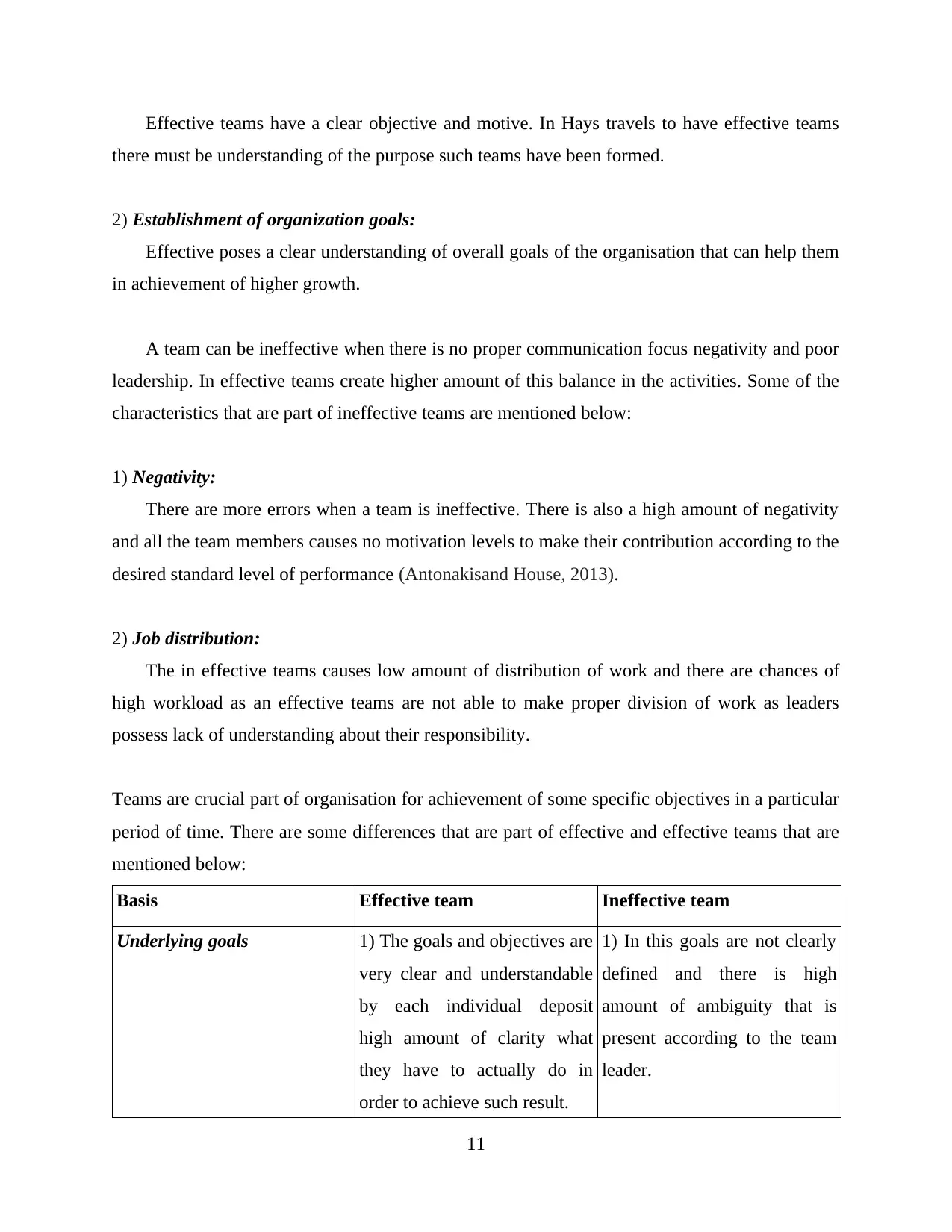
Effective teams have a clear objective and motive. In Hays travels to have effective teams
there must be understanding of the purpose such teams have been formed.
2) Establishment of organization goals:
Effective poses a clear understanding of overall goals of the organisation that can help them
in achievement of higher growth.
A team can be ineffective when there is no proper communication focus negativity and poor
leadership. In effective teams create higher amount of this balance in the activities. Some of the
characteristics that are part of ineffective teams are mentioned below:
1) Negativity:
There are more errors when a team is ineffective. There is also a high amount of negativity
and all the team members causes no motivation levels to make their contribution according to the
desired standard level of performance (Antonakisand House, 2013).
2) Job distribution:
The in effective teams causes low amount of distribution of work and there are chances of
high workload as an effective teams are not able to make proper division of work as leaders
possess lack of understanding about their responsibility.
Teams are crucial part of organisation for achievement of some specific objectives in a particular
period of time. There are some differences that are part of effective and effective teams that are
mentioned below:
Basis Effective team Ineffective team
Underlying goals 1) The goals and objectives are
very clear and understandable
by each individual deposit
high amount of clarity what
they have to actually do in
order to achieve such result.
1) In this goals are not clearly
defined and there is high
amount of ambiguity that is
present according to the team
leader.
11
there must be understanding of the purpose such teams have been formed.
2) Establishment of organization goals:
Effective poses a clear understanding of overall goals of the organisation that can help them
in achievement of higher growth.
A team can be ineffective when there is no proper communication focus negativity and poor
leadership. In effective teams create higher amount of this balance in the activities. Some of the
characteristics that are part of ineffective teams are mentioned below:
1) Negativity:
There are more errors when a team is ineffective. There is also a high amount of negativity
and all the team members causes no motivation levels to make their contribution according to the
desired standard level of performance (Antonakisand House, 2013).
2) Job distribution:
The in effective teams causes low amount of distribution of work and there are chances of
high workload as an effective teams are not able to make proper division of work as leaders
possess lack of understanding about their responsibility.
Teams are crucial part of organisation for achievement of some specific objectives in a particular
period of time. There are some differences that are part of effective and effective teams that are
mentioned below:
Basis Effective team Ineffective team
Underlying goals 1) The goals and objectives are
very clear and understandable
by each individual deposit
high amount of clarity what
they have to actually do in
order to achieve such result.
1) In this goals are not clearly
defined and there is high
amount of ambiguity that is
present according to the team
leader.
11
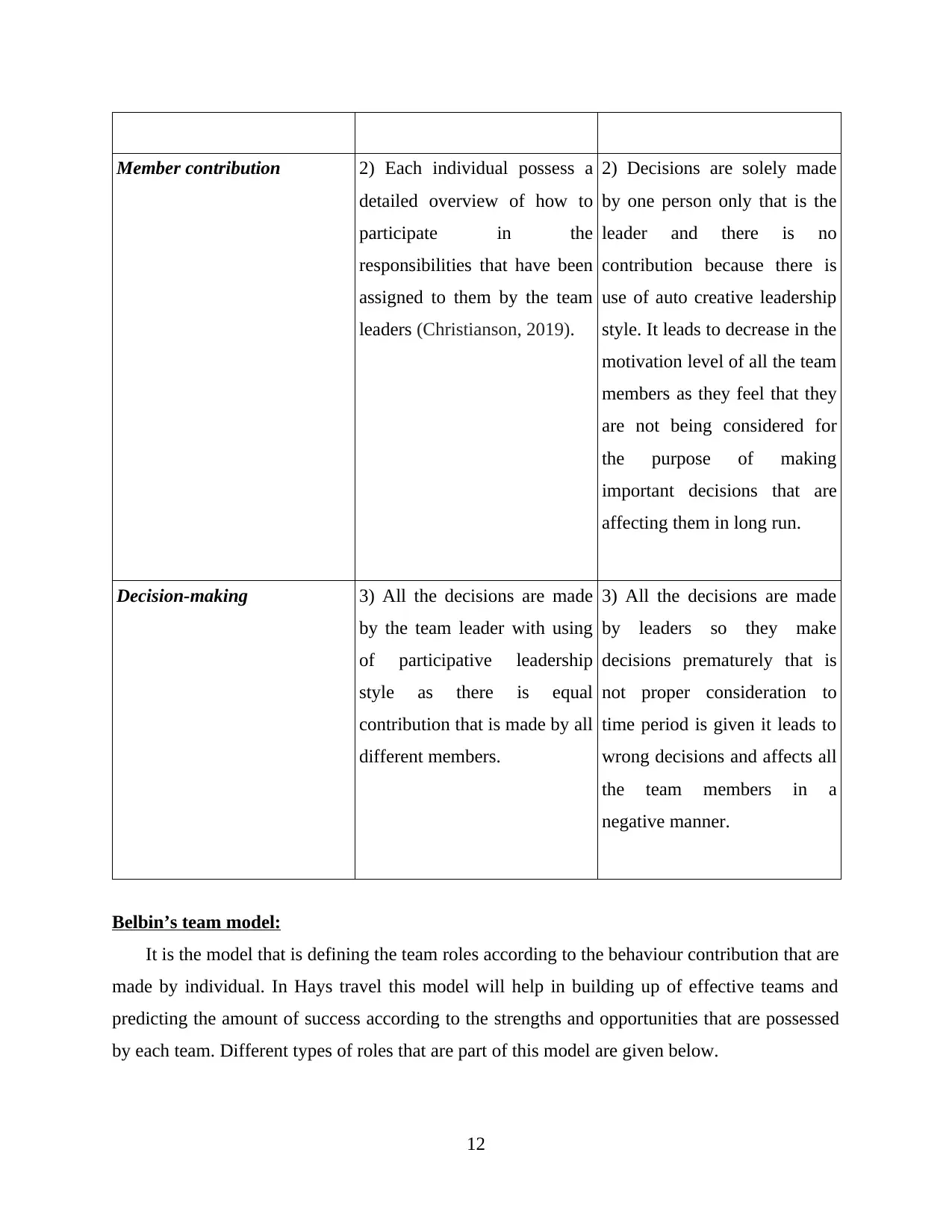
Member contribution 2) Each individual possess a
detailed overview of how to
participate in the
responsibilities that have been
assigned to them by the team
leaders (Christianson, 2019).
2) Decisions are solely made
by one person only that is the
leader and there is no
contribution because there is
use of auto creative leadership
style. It leads to decrease in the
motivation level of all the team
members as they feel that they
are not being considered for
the purpose of making
important decisions that are
affecting them in long run.
Decision-making 3) All the decisions are made
by the team leader with using
of participative leadership
style as there is equal
contribution that is made by all
different members.
3) All the decisions are made
by leaders so they make
decisions prematurely that is
not proper consideration to
time period is given it leads to
wrong decisions and affects all
the team members in a
negative manner.
Belbin’s team model:
It is the model that is defining the team roles according to the behaviour contribution that are
made by individual. In Hays travel this model will help in building up of effective teams and
predicting the amount of success according to the strengths and opportunities that are possessed
by each team. Different types of roles that are part of this model are given below.
12
detailed overview of how to
participate in the
responsibilities that have been
assigned to them by the team
leaders (Christianson, 2019).
2) Decisions are solely made
by one person only that is the
leader and there is no
contribution because there is
use of auto creative leadership
style. It leads to decrease in the
motivation level of all the team
members as they feel that they
are not being considered for
the purpose of making
important decisions that are
affecting them in long run.
Decision-making 3) All the decisions are made
by the team leader with using
of participative leadership
style as there is equal
contribution that is made by all
different members.
3) All the decisions are made
by leaders so they make
decisions prematurely that is
not proper consideration to
time period is given it leads to
wrong decisions and affects all
the team members in a
negative manner.
Belbin’s team model:
It is the model that is defining the team roles according to the behaviour contribution that are
made by individual. In Hays travel this model will help in building up of effective teams and
predicting the amount of success according to the strengths and opportunities that are possessed
by each team. Different types of roles that are part of this model are given below.
12
⊘ This is a preview!⊘
Do you want full access?
Subscribe today to unlock all pages.

Trusted by 1+ million students worldwide
1 out of 19
Related Documents
Your All-in-One AI-Powered Toolkit for Academic Success.
+13062052269
info@desklib.com
Available 24*7 on WhatsApp / Email
![[object Object]](/_next/static/media/star-bottom.7253800d.svg)
Unlock your academic potential
Copyright © 2020–2026 A2Z Services. All Rights Reserved. Developed and managed by ZUCOL.



